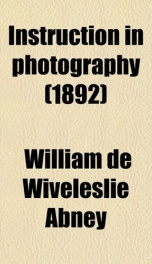instruction in photography

Purchase of this book includes free trial access to www.million-books.com where you can read more than a million books for free. This is an OCR edition with typos. Excerpt from book: CHAPTER III. MEASUREMENT OF DENSITIES OF NEGATIVES AND DEPTH OF PRINTS In our present state of photographic progress it is not only felt that a printable negative should be made, but also that the density which will give such negative should be known. With this object in view, it may be well to point out a method by which the density of a negative or the depth of a print may be measured with great exactitude and in a very simple manner. Fig. 4. Suppose F to be a half-plate ferrotype or a piece of blackened card of the same size. In either of them pierce a Square aperture A, and cover it and a similar square surface, B, with white Saxe paper, and surround these two squares with black paper. If now a candle or small lamp be placed on the opposite side of the screen held vertically, the square A will be illuminated when viewed from the front. If, in a darkened room, another small candle or lamp be placed in front of the screen, both A and B will be illuminated. If, however, a rod of the diameter of B be so placed that its shadow is cast on A, both squares will be still illuminated, A by the lamp at the back, and B by the lamp in the front. By moving the lamp in front nearer to or further from the screen, the two squares can be made equally bright to the eye. If, close behind A, we place a bit of the negativewhose transparency we wish to measure, we can again make the brightness of the two squares equal; and if we have measured the distance from the screen in the two cases, we can at once find out the light coming through the piece of negative. Thus, suppose in the first case the light had to be 36 inches from the square, and in the second only 9 inches, we should know that only -jV of light was passing through the negative, as the brightness would be inversely as the squa...
Info about the book
Author:
Series:
Unknown
ASIN:
114862421X
Rating:
2.5/5 (40)Your rating:
0/5
Languge:
English
Users who have this book
Users who want this book
What readers are saying
What do you think? Write your own comment on this book!
write a commentif you like instruction in photography try:
Do you want to exchange books? It’s EASY!
Get registered and find other users who want to give their favourite books to good hands!


